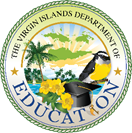NCLB Infomration
| NCLB Info |
|
The No Child Left Behind Act of 2001 (NCLB), which reauthorized the Elementary and NCLB FAQ What is the definition of a highly qualified teacher? The requirement that teachers be highly qualified applies to all public elementary or secondary school teachers employed by a local educational agency who teach a core academic subject.
“Highly Qualified” means that the teacher:
1. Has obtained full State certification as a teacher or passed the State teacher licensing examination and holds a license to teach in the State, and does not have certification or licensure requirements waived on an emergency, temporary, or provisional basis;
2. Holds a minimum of a bachelor’s degree; and
3. Has demonstrated subject matter competency in each of the academic subjects in which the teacher teaches, in a manner determined by the State and in compliance with Section 9101(23) of the ESEA.
The statutory definition includes additional elements that apply somewhat differently to new and current teachers, and to elementary, middle and secondary school teachers. The complete definition of “highly qualified teacher” is in Section 9101(23) of the ESEA.
What is meant by “core academic subjects”? The term “core academic subjects” means English, reading or language arts, mathematics, science, foreign languages, civics and government, economics, arts, history, and geography [Section 9101(11)]. While the list of core academic subjects in the statute includes the arts, it does not define specifically which arts courses are core academic subjects. States may decide which arts courses will be considered as core academic subjects.
How does the State determine if a current teacher (elementary, middle, or secondary) is highly qualified? The SEA is responsible for developing and approving methods for ensuring that teachers have, in addition to a bachelor’s degree and full State certification, subject-matter competency and teaching skills. Teachers can demonstrate their competency and skills by (a) passing a rigorous State academic subject matter test, (b) in the case of middle or secondary school teachers, completing an academic major, graduate degree, coursework equivalent to an academic major, or advanced certification or credentialing, or (c) using the high, objective, uniform State standard of evaluation (HOUSSE) [Section 9101(23)].
How does the State determine if new elementary school teachers have the subject matter knowledge and teaching skills that are needed of highly qualified teachers? To meet the requirements of the law, new teachers at the elementary level must (1) hold at least a bachelor’s degree, (2) be licensed by the State, and (3) demonstrate, by passing a rigorous State test, subject knowledge and teaching skills in reading, writing, mathematics, and other areas of the basic elementary curriculum [Section 9101(23)(B)(i)]. While the Department is always willing to respond to inquiries from States, it is the responsibility of the SEA to identify and approve specific tests. We recommend that each SEA use the guidelines below to evaluate any tests that it wishes to consider for use in its State.
How does the State determine if new middle and high school teachers have a high level of competence in each of the subjects the teacher will teach? |
